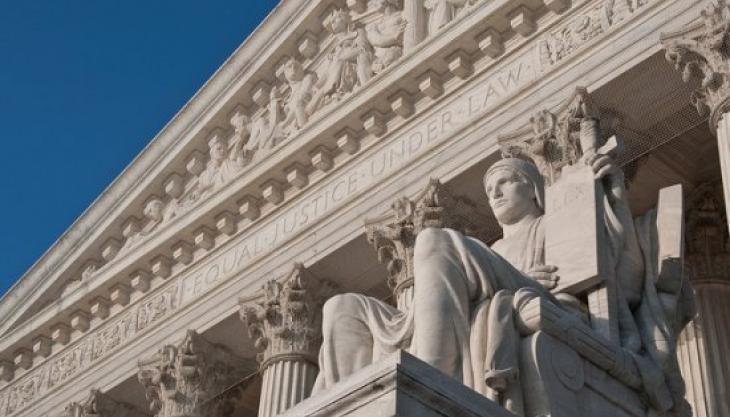Supreme Court Supports Debtors in Chapter 13 Conversion to Chapter 7 Ruling
Submitted by Rachel R on Thu, 06/11/2015 - 12:52pm

Supreme Court rules in bankruptcy conversion case
Image Source: Flickr User Mark Fischer
The Supreme Court issued a ruling in May that greatly benefits consumers that are in a Chapter 13 bankruptcy but then convert to Chapter 7. The recent landmark case was Harris v Viegelahn that came to the high court after a split in the Court of Appeals. Here's a look at the case, and what it means to bankruptcy filers across the country.
The facts of the case
The debtor in the case, Charles Harris, initially filed Chapter 13 bankruptcy and had a payment plan approved by the court. He began making $530 payments to Trustee Mary Viegelahn and paid his current mortgage payments outside of the plan. The payment plan was to cover mortgage arrears to Chase Manhattan Bank, the mortgage holder, plus debt to other creditors.
At some point in the payment plan, Harris found he could no longer keep up with the mortgage payments and stopped making them. As a result, his home was foreclosed on yet Harris continued to make his payments to the Trustee as part of the Chapter 13.
A year later, Harris decided to convert his Chapter 13 to a Chapter 7 bankruptcy. At the time Harris requested his case to be converted, there was roughly $5,500 in undistributed funds in the Trustee's hands. Ten days after his attorney converted the case, Trustee Mary Viegelahn distributed the $5,500 to creditors and her commission. Harris' attorney sued to get the $5,500 back.
How these cases have been handled in the past
When debtors convert cases from a Chapter 13 to a Chapter 7, there were three schools of thought on how these funds should be treated. The first was to give the debtor back the money. Some courts opted to give any undistributed funds back to the debtor after a conversion saying that's where the money properly belonged. The second option was to let the Trustee keep the money to repay creditors and their commission. The third was to allow the accumulated funds to flow into the debtor's Chapter 7 estate.
Chapter 11 bankruptcy law under Section 1326(a)(2) says, “If a plan is confirmed, the trustee shall distribute any such payment in accordance with the plan as soon as is practicable.” In appealing to the Supreme Court to consider the case and force the Trustee to return the funds, Harris' attorney proposed that the funds were not available to the Trustee because the “property of the estate had re-vested in the debtor by the time, post-conversion, that the trustee disbursed funds to creditors.”
The two sides of the case
The Trustee opposed the Supreme Court considering the case and Viegelahn's assertion was that “Chapter 13 of Title 11 is not intended to create a savings account while a debtor contemplates conversion to another chapter.” But despite the Trustee's opposition, the Supreme Court took on the case and ruled in favor of the debtor in this case – and all debtors in future circumstances the same as Harris.
The Supreme Court ruled in a 9-0 decision that the moment the Chapter 13 plan is terminated, the deal is immediately off with the Trustee and creditors. The high court decided all money not paid out is due back to the debtor right away. Justice Ruth Bader Ginsburg wrote the unanimous opinion that said that returning the money to the debtor is “the most sensible reading” of the intent of the law. This ruling is very beneficial to future debtors that may choose to convert from a Chapter 13 to a Chapter 7.
For many consumers, converting a Chapter 13 to a Chapter 7 can be very beneficial. Many choose a Chapter 13 initially to try and save a home or car from repossession or foreclosure. When this situation is resolved, either through a foreclosure, refinance or paying off past due balances, converting to a Chapter 7 can be a great way to wipe out remaining unsecured debt and get a complete fresh start.
To find out more about how bankruptcy offers peace of mind and a solution to the stresses of living paycheck to paycheck, contact the law offices of John T Orcutt. Call +1-833-627-0115 to speak to a North Carolina bankruptcy expert today – we offer free consultations in Greensboro, Raleigh, Fayetteville, Garner, Wilson and Durham.
Debts Hurt! Got debt? Need help? Get started below!
Serving All of North Carolina
- Bankruptcy Attorneys Raleigh NC (North)
- Bankruptcy Attorney Fayetteville NC
- Bankruptcy Attorney Durham NC
- Bankruptcy Attorneys Wilson NC
- Bankruptcy Attorneys Greensboro NC
- Bankruptcy Attorneys Southport NC
- Bankruptcy Attorneys Wilmington NC
Bankruptcy Attorneys Raleigh NC (North)
6616 Six Forks Rd #203 Raleigh, NC 27615 North Carolina
Tel: (919) 847-9750

Bankruptcy Attorney Fayetteville NC
2711 Breezewood Ave Fayetteville, NC 28303 North Carolina
Tel: (910) 323-2972

Bankruptcy Attorney Durham NC
1738 Hillandale Rd Suite D Durham, NC 27705 North Carolina
Tel: (919) 286-1695


Bankruptcy Attorneys Greensboro NC
2100 W Cornwallis Dr. STE O Greensboro, NC 27408 North Carolina
Tel: (336) 542-5993

Bankruptcy Attorneys Southport NC
116 N Howe St. Suite A Southport, NC 28461 North Carolina
Tel: (910) 218-8682

Bankruptcy Attorneys Wilmington NC
116 N. Howe Street, Suite A Southport, NC 28461 North Carolina
Tel: (910) 447-2987
